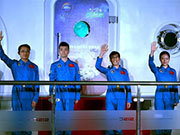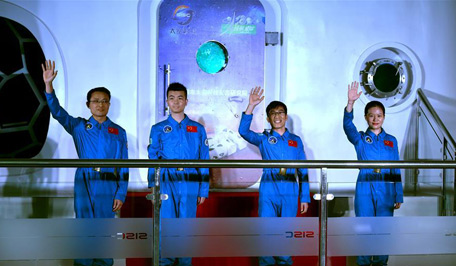China's 180-day space survival simulation ends

 0 Comment(s)
0 Comment(s) Print
Print E-mail CNTV, December 15, 2016
E-mail CNTV, December 15, 2016
Volunteers lived inside a sealed space capsule for six months to test technologies that could support deep space exploration. The project started in June. It is designed to test the "controlled ecological life support system," which is inspired by technologies used on China's Shenzhou spacecraft.
 |
|
China's 180-day space survival simulation ends |
The experiment examines how oxygen, water and food can be used and reused in space. Scientists are also monitoring and observing how a hermetic environment affects physiological changes, biological rhythms, sleep patterns and psychological health.
"Diet, metabolism and rhythm can be finely controlled under a hermetic environment. So it provides a good opportunity for us to study how the the human body reacts to the environment, and how this leads to a physiological disorder," said Xiong Jianghui, Space Institute of Southern China.
"This kind of research can provide a sound data foundation for our study in a zero-gravity environment."
A hermetic environment can also bring emotional fluctuations.
"For me, the psychological influence becomes apparent in the the middle and later periods, as we get more work stress and feel tired. I can feel the physical and emotional state get relatively worse in this period," volunteer Tang Yongkang said.
"In a long-term hermetic environment experiment, a depressive state can be felt to the utmost extent when it passes three-quarters of the time. The results of the 180-day experiment can provide a reference," Xiong said.
The emotional fluctuations can also trigger a series of physiological changes. To relieve the psychological pressure, the program has invited psychologists to offer counselling to the volunteers. A set of taiji exercises specially designed for the program has also played a role in emotional adjustment.
More than a dozen Chinese and overseas institutions are involved in the experiment. They include the Astronaut Center of China, Harvard University and the German Aerospace Center. The results are considered critical to determining the viability of long-term space travel.





